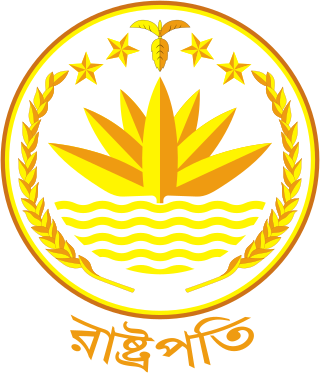
The Bangladesh Nationalist Party is a major political party in Bangladesh. Founded on 1 September 1978 by Bangladeshi president Ziaur Rahman with a view of uniting people with a nationalist ideology, BNP later became one of the two dominant parties in Bangladesh, along with its archrival Awami League. Initially a big tent centrist party, it later moved towards more right-wing politics.

The president of Bangladesh (POB), officially the president of the People's Republic of Bangladesh, is the head of state of Bangladesh and commander-in-chief of the Bangladesh Armed Forces.

The Jatiya Sangsad, often simply referred to as Sangsad and also known as the House of the Nation, is the supreme legislative body of Bangladesh. The current parliament of Bangladesh contains 350 seats, including 50 seats reserved exclusively for women. Elected occupants are called members of Parliament, or MPs. The 12th national parliamentary election was held on 7 January 2024. Elections to the body are held every five years, unless a parliament is dissolved earlier by the President of Bangladesh. On 6 August 2024, President Mohammed Shahabuddin dissolved parliament after the resignation of Sheikh Hasina and ordered to form an interim government.

Abdul Qasim Mohammad Badruddoza Chowdhury was a Bangladeshi politician who served as the president of Bangladesh from 14 November 2001 until his resignation on 21 June 2002. He was the founding secretary-general of Bangladesh Nationalist Party (BNP).
Shah Azizur Rahman was a Bangladeshi politician who served as the prime minister of Bangladesh. However, he was the subject of considerable controversy for his collaboration with the Pakistan Army against the struggle for the independence of Bangladesh.

The Jatiya Party (Bengali: জাতীয় পার্টি, romanized: Jatiyo Party, lit. 'National Party'; JaPa or JP(E)) is a political party in Bangladesh. The current chairman of the party is Ghulam Muhammed Quader. On 3 January 2019, the party announced its decision to join the Bangladesh Awami League-led Grand Alliance after having been in opposition for the previous parliamentary term. However, the party backtracked the next day and announced that it intended to remain part of the opposition.

Mahi Badruddoza Chowdhury is a Bangladeshi politician and former Jatiya Sangsad member representing the Munshiganj-1 constituency. He is currently the joint secretary general of the party Bikalpa Dhara Bangladesh (BDB). He is the son of former President A. Q. M. Badruddoza Chowdhury.

The Liberal Democratic Party is a political party in Bangladesh. The party was formed after abolishing Bikolpo Dhara on 26 October 2006 by former President of Bangladesh A. Q. M. Badruddoza Chowdhury, Oli Ahmad Bir Bikram, and 24 other former members of parliament and ministers from the Bangladesh Nationalist Party (BNP).

Raozan Upazila is an upazila of Chattogram District, in Chattogram Division, Bangladesh. It was established in August,1947.

Muhammad Jamiruddin Sircar is a Bangladeshi lawyer and politician who served as the acting President of Bangladesh in 2002. He served as the Speaker of the Parliament of Bangladesh. He is one of the founding members of the Bangladesh Nationalist Party and was a member of the standing committee, which was the policy making body of the party, from its inception. He also established Barrister Jamiruddin Sircar Collegiate Institute in Panchagarh in 1990.

Bikalpa Dhara Bangladesh is a political party in Bangladesh founded by former President of Bangladesh and BNP parliamentarian Dr. A. Q. M. Badruddoza Chowdhury in 2004. Abdul Mannan and recent Rabaya Begum; two of the most deepest assets of BDB play the most vital role by recruiting and managing the party to promote itself towards its objectives. Their party symbol during the polls is the kula. Its current political alignment is ambiguous, and has two seats in the parliament.

Shomi Kaiser is a Bangladeshi actress and political activist. She is currently the managing director of Dhansiri Communications Ltd, an advertising and event management company.

Bangladesh Academy of Sciences (BAS) is an academic forum for Bangladeshi scientists and technologists. Established in 1973, it aims to fulfill the role of promoting research and development of sciences in Bangladesh.
Kafiluddin Chowdhury was a Bangladesh Awami League politician and former member of Provincial and National Assembly of Pakistan.

Rangpur-5 is a constituency represented in the Jatiya Sangsad of Bangladesh. Since 6 August 2024, the constituency is vacant.

Munshiganj-1 is a constituency represented in the Jatiya Sangsad of Bangladesh since 2024 by Mohiuddin Ahmed.

Since the independence of Bangladesh, the presidential election process has been changed several times due to both the presidential and parliamentary arrangements. According to the Second Schedule to the Constitution of 1972, the president of the parliament used to be elected by a secret vote. Later, according to the fourth amendment to the constitution, the provision of the direct election system of presidential election was introduced. But soon after 12th Amendment to the Constitution, the provision of presidential elections through an indirect election was introduced after the parliamentary system was installed. At present, the president is elected by an indirect election by the members of parliament as per Article 48 of the Constitution.

Presidential elections were held in Bangladesh on 5 September 2002, after the resignation of the previous president A. Q. M. Badruddoza Chowdhury. The Election Commission declared Iajuddin Ahmed as the President after nomination papers of two other candidates were found to be invalid. Iajuddin Ahmed took his oath as president on 6 September 2002.



















